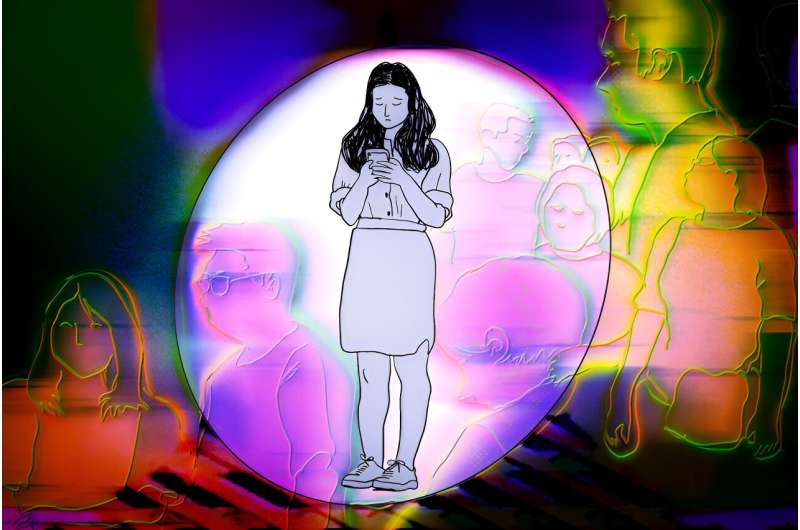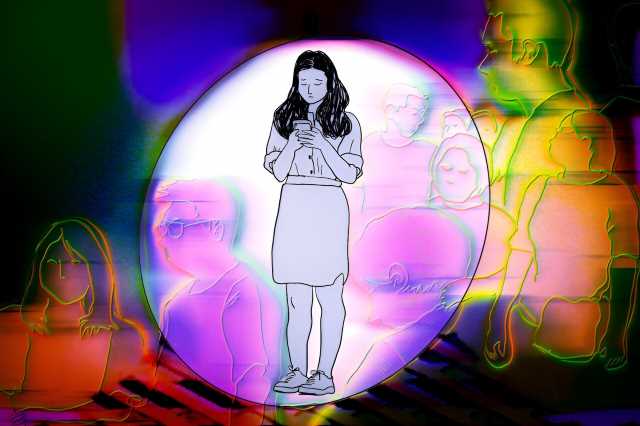
It’s the height of summer break, and as students decompress from the school year, they also have more time for scrolling social media. What effect do these platforms have on the young people’s mental health?
In late May, the U.S. Surgeon General Vice Admiral Vivek H. Murthy published an advisory report on the subject, noting the “unprecedented” challenges faced by today’s youth in navigating social media, and emphasizing the “alarming” effects social media can have on many people.
The advisory cited the research of, among others, Alexey Makarin, an assistant professor at the MIT Sloan School of Management. Last fall, Makarin was co-author of a study published in the American Economic Review, “Social Media and Mental Health,” which used an innovative, quasiexperimental approach to conclude that introduction of Facebook on some college campuses in the early 2000s led to an increase in mental health problems in those places.
Makarin talked to MIT News about the advisory report, his work, and the subject in general.
Q: What did you think of the surgeon general’s report on social media and youth mental health?
A: The tone and the summary of the evidence seem very appropriate and balanced, in my view. The summary of the literature is on point. Indeed, I think the literature overall is moving toward a consensus that social media has some negative effects on youth mental health.
Q: What was the core finding of the paper you co-authored, which is cited in the surgeon general’s report?
A: Our own paper provides pretty persuasive evidence, I would say, that social media has a negative effect on youth mental health. We study the staggered introduction of Facebook across U.S. colleges and use a difference-in-differences estimation strategy to isolate the causal impact of Facebook vis-a-vis any differences across colleges or nationwide changes.
We find Facebook had a negative causal impact of Facebook’s rollout on the mental health of college students. In particular, the most affected conditions were depression and anxiety disorders. We find that among people who, based on their observable characteristics, were most predisposed to mental health problems, the effect was bigger, and those people were more likely to take up mental health services, such as antidepression therapy. We also find that students reported experiencing issues with academic performance due to their worsening mental health.
Q: How did this effect occur?
A: If you think about mechanisms, what is actually lying underneath this impact of Facebook on mental health, the evidence in our paper is most consistent with the mechanism of negative social comparisons. People just start to compare themselves negatively to their peers; we believe that is what’s beneath [our results]. We provide two pieces of evidence in support of this channel.
First, [the effects we find in the study] are in general bigger for students who might compare themselves negatively to their peers, such as those who live off campus, are overweight, or have personal credit card debt.
Second, students suddenly start to believe that the consumption of alcohol went up significantly in their colleges, while the actual consumption stayed the same. So, students start to have an inflated impression of their peers’ social lives.
Q: Your study covers a time period early in Facebook’s existence, when it didn’t have all the features it has now, and when people may have engaged with it a bit differently. To what extent do these findings apply to current-day social media dynamics?
A: There are two answers to that question. Number one, while this is a particular period that we are studying, this is the only time where we can use a quasiexperimental method to study the general effects of the introduction of social media to a particular group of people.
Number two, in relation to the causal issues we mention: We can compare the estimates we find in our study and the estimates by another influential paper, “The Welfare Effect of Social Media,” [by Hunt Allcott, Luca Braghieri, Sarah Eichmeyer, and Matthew Gentzkow], in which they randomly incentivize people to deactivate their Facebook accounts, at the individual level. Their estimate of the impact of this on depression is very, very similar in magnitude to what we find in our case.
So, even though you have these two different studies, one from 2004–2006, and one from the late 2010s, they find similar effects. They use different methods, but both of them identify causal effects. This causal evidence reassures us that what we find is externally valid.
Q: So to turn my previous question around, in a sense, while your study was very specific, you found a mechanism that is likely at play in the larger world of social media today. After all, on many platforms today, you can compare yourself to others through likes, followers, retweets, and more.
A: Yes, to the extent the mechanism we found is inherently a feature of social media—which is something we believe. When Facebook rolled out it was bare-bones, but you saw who had how many friends, and who had the best pictures. This social comparison aspect is still very important to social media. The [cause of the] negative effects we find is something that all social media platforms seem to feature, to one extent or another.
Q: What does the future hold for us, in terms of grappling with social media from an individual or policy perspective, and limiting its negative mental health effects?
A: In general, there is a sense among economists, at least, that there is a lot of value generated by these platforms. People do want to spend a lot of time on them. The issue is with the addictive part, the behavioral influence. There is active research on this topic, and I believe in a couple years we’ll have a better understanding of how to live in a more healthy way alongside social media. I don’t think we’re going to ban social media, and it’s not possible to go back in time before it, so I think we need to learn how to live alongside this technology.
Journal information:
American Economic Review
Source: Read Full Article
